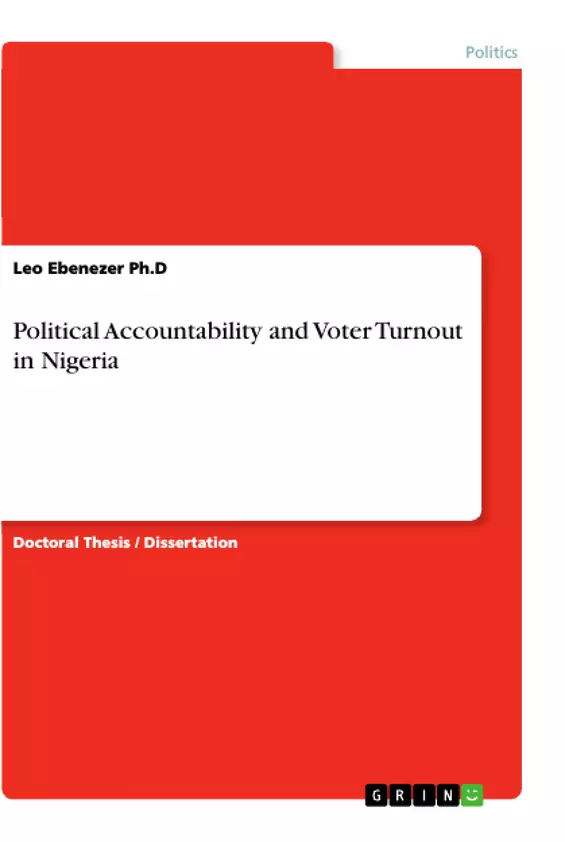This study examined the impact of political accountability on voter turnout in Nigeria’s elections (1999 – 2015). The objectives were to examine the impact of lack of political accountability on voter turnout and how voters could hold their representatives accountable to increase voter turnout in Nigeria’s elections. This work was anchored on two theories: the "Rational Choice Theory" and the "Civic Duty Theory" of Voter Turnout.
The former stressed that voters vote to maximize benefits, while the latter considered fulfilment of civic duty as the major consideration for voting. This research made use of descriptive research design and survey method. The data employed for the study were gathered from both primary (questionnaire) and secondary (books, journals etc) sources. Both content and statistical (tables, charts, percentages) analytical techniques were used in the interpretation and analysis of data. A purposive (judgmental) sampling method was adopted in this research. A sampling size of 1,200 respondents, 200 from each of the states across the six geopolitical zones of Nigeria was used for study. INEC and FES (2011) provided the nationally representative sampling method adopted in this research.The findings were that lack of political accountability exacerbated low voter turnout. It also bred corruption, insecurity, violence and opaque governance system which diminished voters’ interest in elections. It also observed that the average percentage of voter turnout in the elections conducted in Nigeria from 1999 to 2015 was 48%. In relation to the eligible voters, it was 36% in the same period.
This work concluded that there is the need for the accountability of political and public officeholders in Nigeria to improve voter turnout in elections. It recommended political accountability of political officeholders and electronic voting system to ensure increase in voter turnout in elections in Nigeria.
Inhaltsverzeichnis (Table of Contents)
- CHAPTER ONE
- INTRODUCTION
- Background to the Study
- INTRODUCTION
Zielsetzung und Themenschwerpunkte (Objectives and Key Themes)
This research aims to explore the relationship between lack of political accountability and low voter turnout in Nigeria from 1999-2015. It seeks to understand the historical context of this issue, identify the causes of low voter turnout, and propose solutions to enhance political participation and increase voter turnout.
- The impact of lack of political accountability on voter turnout in Nigeria.
- Historical trends and causes of declining voter participation in Nigeria.
- The role of corruption, electoral violence, and manipulation in hindering political accountability.
- Strategies to restore political accountability and improve voter turnout.
- The connection between political accountability and trust in democratic processes.
Zusammenfassung der Kapitel (Chapter Summaries)
Chapter One provides a comprehensive background to the study by examining the historical evolution of voter turnout in Nigeria from independence to the early 1990s. It highlights how the lack of political accountability among the elite has consistently led to voter apathy and declining participation in elections. The chapter concludes by posing key questions about the persistent issue of low voter turnout and the challenges of holding representatives accountable.
Schlüsselwörter (Keywords)
This research focuses on the intertwined themes of political accountability, voter turnout, and democratic participation in Nigeria. Key concepts include corruption, electoral violence, manipulation, trust, and the historical context of electoral trends in the country. The study aims to analyze the complex relationship between these factors and their impact on the efficacy of Nigerian democracy.
Frequently Asked Questions
What is the relationship between political accountability and voter turnout in Nigeria?
The study finds that a lack of political accountability leads to low voter turnout. When representatives are not held accountable, it breeds corruption and insecurity, which diminishes citizens' interest in participating in elections.
What was the average voter turnout in Nigeria between 1999 and 2015?
The average voter turnout during this period was 48% of registered voters, but only 36% when measured against the total eligible voting population.
Which theories are used to explain voter behavior in this research?
The research is anchored on the "Rational Choice Theory" (maximizing benefits) and the "Civic Duty Theory" (voting as a moral obligation).
What are the main causes of voter apathy in Nigeria?
Key factors include corruption, electoral violence, opaque governance, and a general lack of trust in the democratic process due to the elite's lack of accountability.
What solutions does the study propose to increase voter turnout?
The study recommends strengthening political accountability for officeholders and implementing an electronic voting system to ensure transparency and boost public confidence.
- Citation du texte
- Leo Ebenezer Ph.D (Auteur), 2018, Political Accountability and Voter Turnout in Nigeria, Munich, GRIN Verlag, https://www.grin.com/document/936764



